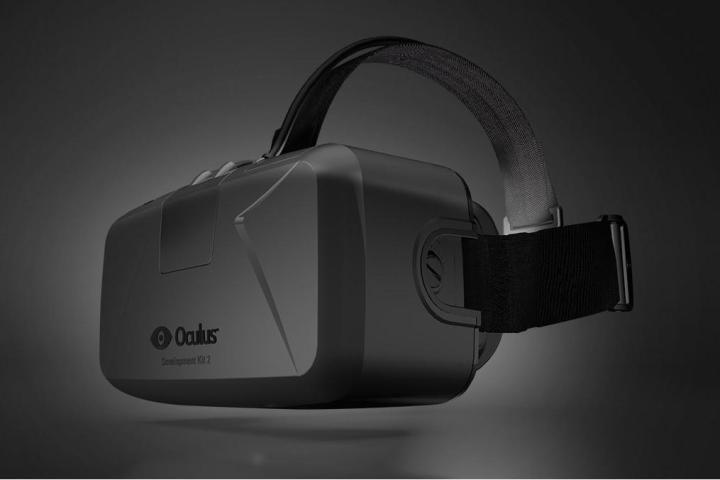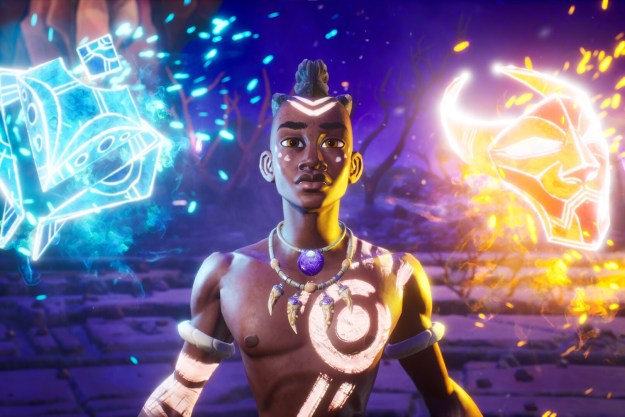
No one has to say it; VR’s unreadiness was evident in its very presence at E3. It’s right on the cusp of being real. Oculus had a sizable booth on the show floor devoted to dazzling attendees with what the Rift can do — press and business meetings happened in a separate location — and Sony carved out a large chunk of its own mammoth booth for face time with the Morpheus. We’re a long way off from the secret Oculus demos that John Carmack hosted in a small room at the back of Bethesda Softworks’ booth in 2012.
Put either of these two recognizable headsets on and you immediately see the need for more development time. We live in a high-def world now, to the point that anything less just doesn’t look right. Oculus and Morpheus both sport the so-called “screen door effect” in their displays, with the lines separating the pixels giving the impression that you’re looking through… well, a screen door. Both also still suffer from some of the blurring that is the product of high latency.

Oculus had a handful of demos to show off during its behind-closed-doors meetings at E3. The closest to a fully baked game was Superhot, which actually started life as a browser-based game that was created as part of 2013’s 7 Day FPS Challenge. It’s a minimalistic first-person shooter with an unusual twist: incoming fire from your enemies only moves when you do. The ensuing play — which involves dodging fire as you run for a weapon to take out your attackers with — amounts to a rough approximation of The Matrix‘s bullet-time moments. It’s a great fit for the Rift’s motion-and-depth-sensing capabilities.
The second demo, Lucky’s Tale, stepped away from increasingly common first-person perspective to show how VR can enhance different genres. In this case, a third-person platformer, a la Super Mario 64. Superhot uses VR to enhance the gameplay, but Lucky’s Tale uses it to beef up the presentation. The demo’s relatively generic set of platform challenges and squashable monsters is hardly original, but its diorama-style presentation in a VR space makes for a much more immersive experience.
As with all VR, it’s hard to describe Lucky’s Tale; you’ve just got to experience it. The colorful world looks like a physical toy set. You can lean in to check out fine details, and even peer around objects to see what’s behind them. There may not be much to the game in its tech demo form, but it makes a convincing statement about the potential of VR gaming outside of the first-person perspective.
Oculus’ final demo was a Rift-tuned take on Alien: Isolation, the upcoming survival horror game from the Creative Assembly. More a one-room, specially tailored demo than a chunk of the actual game, players creep around a set of space station corridors as the Xenomorph hunts. It’s certainly not unpleasant to play, with the headset’s all-encompassing display effectively immersing you into a terrifying scenario, but the mechanics of it all still feel like a console game. Superhot and Lucky’s Tale both make far more convincing arguments as examples of VR gaming. Isolation could definitely be tailored to work well in VR, but it would need to be more than just a straight port.
Sony only had one new demo to show off for its Project Morpheus headset, in addition to the two that debuted earlier in the year at the 2013 Game Developer’s Conference. The new demo, a street luge simulator, ditches controllers and Move wands entirely, instead depositing players in a beanbag chair and tasking them with leaning left/right to guide a wheeled luge down a mountainside highway. It’s an exhilarating experience, but simple in the way that all tech demos are. Lots of promise, not much depth.

Don’t take any of this as a bad thing for VR’s prospects. It’s simply an important reality check. Hype’s been running high for a very long time on VR (relatively speaking), and the flag-bearers for the tech need to manage expectations. There’s no point getting consumers excited right now for something they can’t play with this year. It’s looking very likely that Oculus, and possibly Sony as well, will be ready to go in 2015. Oculus already has a consumer prototype running in its home office (E3’s demo unit was just a second-gen dev kit), and there’s plenty of time to improve on the tech before release plans are finalized.
So no VR for 2014, but don’t mistake the silence for a lack of progress. The tech’s come a long way since Carmack showed off his home-built Oculus back in 2012, and work continues. Oculus and Sony both have heavy bets on VR as a brand new platform, and we can almost certainly expect a big push to crystallize their plans in 2015.






